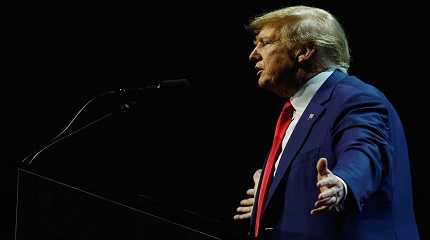
NEW YORK, April 25 (Reuters) - Donald Trump went on trial on Tuesday, where the writer E. Jean Carroll accuses the former U.S. president in a civil lawsuit of raping her in a department store dressing room in the mid-1990s.
Jury selection began in Manhattan federal court in the former Elle magazine advice columnist's case, where Carroll is also accusing Trump of defamation.
Trump, 76, has denied raping Carroll, 79.
He called her claim a "hoax" and "complete Scam" in a October 2022 post on his Truth Social platform. Trump also said she made up the encounter to promote her memoir and declared that she was "not my type!"
The trial is expected to last one to two weeks.
It is part of a slew of lawsuits and investigations facing Trump, the Republican front-runner in the 2024 presidential race, and could be politically damaging as witnesses discuss his alleged sexual misconduct, all of which he denies.
The trial began the same day President Joe Biden, a Democrat, said he would seek a second White House term.
Trump was not in the courthouse and not required to attend the trial, and his lawyers have indicated he likely will not testify in his defense. Lawyers for Carroll also do not plan to call Trump as a witness.
Carroll is seeking unspecified damages for what she calls significant pain and suffering, lasting psychological harm, and invasion of privacy.
JUDGE WARNS AGAINST INCITEMENT
Before juror questioning began, U.S. District Judge Lewis Kaplan instructed Trump's and Carroll's lawyers to tell their clients and witnesses not to make statements that could "incite violence or civil unrest."
Kaplan is keeping jurors anonymous from the public and the lawyers, to shield them from potential harassment by Trump supporters.
He suggested to prospective jurors that they not use their real names when speaking with one another.
"If you're normally a Bill and you're selected for the jury or even before, you can be John for a couple of days," he told them.
Trump has repeatedly attacked Carroll and in personal terms, once calling her mentally ill, since she first publicly accused him of rape in June 2019.
Carroll said her encounter with Trump at the Bergdorf Goodman store occurred in late 1995 or early 1996.
She said Trump recognized her, calling her "that advice lady," and asked for help in buying a gift for another woman.
Carroll said Trump then "maneuvered" her into a dressing room where he shut the door, forced her against a wall, pulled down her tights and penetrated her. She said she broke free after two to three minutes.
Trump's lawyers may try to undermine Carroll's credibility by noting that she did not call the police, remained publicly silent for more than two decades, and cannot remember the date or even the month of the alleged attack.
Carroll has said the #MeToo movement inspired her to come forward.
Jurors are also expected to hear the infamous 2005 "Access Hollywood" tape where Trump made graphic, vulgar comments about women.
OTHER TRUMP CASES
Other legal matters Trump faces include Manhattan District Attorney Alvin Bragg's criminal charges over hush money payments to a porn star.
Trump pleaded not guilty to those charges on April 4 at a New York state courthouse, a three-minute walk from Tuesday's trial.
The former president also faces civil fraud charges by New York Attorney General Letitia James into his namesake company.
Trump also faces criminal probes into interference in Georgia's 2020 presidential race and into classified government documents recovered at his Mar-a-Lago residence, plus inquiries into his role in the Jan. 6, 2021, attack on the U.S. Capitol.
In all of these cases, Trump has denied wrongdoing.
Carroll is also suing Trump for defamation after he first denied her rape claim in June 2019, when he was still president. That case remains pending before Kaplan.




